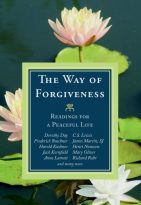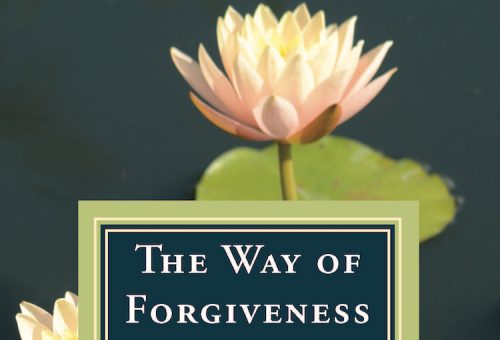“The Way of Forgiveness: Readings for a Peaceful Life,” edited by Michael Leach, James T. Keane and Doris Goodnough. Orbis Books (Maryknoll, New York, 2019). 236 pp., $18.
“Forgiveness Makes You Free: A Dramatic Story of Healing and Reconciliation From the Heart of Rwanda” by Father Ubald Rugirangoga. Ave Maria Press (Notre Dame, Indiana, 2019). 161 pp., $16.95.
By Kathleen Finley
Forgiveness. It may sound easy, but in fact it’s one of the toughest challenges for us as humans and as Christians. Two new books point the way to new perspectives on this key experience that holds so much promise as well as so much difficulty for us.

“The Way of Forgiveness: Readings for a Peaceful Life” is a collection of powerful quotes and stories that help move the reader to understand and appreciate how important forgiveness is. Just like two other similar books, “The Way of Kindness: Readings for a Graceful Life” and “The Way of Gratitude: Readings for a Joyful Life,” the editors have collected some amazing excerpts that help the reader explore the various aspects of a particular virtue.
A few examples from this one: Frederick Buechner: “To forgive somebody is to say one way or another, ‘You have done something unspeakable, and by all rights I should call it quits between us. Both my pride and my principles demand no less. However, although I make no guarantees that I will be able to forget what you’ve done, and though we may both carry the scars for life, I refuse to let it stand between us. I still want you for my friend.'”
Or from Father Henri Nouwen: “Forgiveness is the name of love practiced among people who love poorly. The hard truth is that all of us love poorly. We do not even know what we are doing when we hurt others. We need to forgive and be forgiven every day, every hour — unceasingly. That is the great work of love among the fellowship of the weak that is the human family.”
In one essay, Mike Leach, one of the editors, suggested to Pope Francis when he was newly elected that he declare a Forgiveness Sunday worldwide, where we all ask for forgiveness and grant it to others.
And, last but not least, Rabbi Harold Kushner reminds us, “Forgiveness is not a favor we do for the person who offended us. It is a favor we do for ourselves, cleansing our souls of thoughts and memories that lead us to see ourselves as victims and make our lives less enjoyable. When we understand that we have little choice as to what other people do but we can always choose how we will respond to what they do, we can let go of those embittering memories.”

The second book, part personal memoir and part meditation urging the reader to embark on forgiveness, applies all this to a specific situation and is based in Father Rugirangoga’s horrible experiences of his family’s destruction and death, along with 45,000 others, in the Rwandan genocide 25 years ago.
As he has done for many others as an evangelical speaker, Father Rugirangoga helps the readers come to terms with any area of their lives that still needs forgiveness, with the authority that only someone who has struggled with this himself can have. First his father and later his mother and most of his siblings were slaughtered, along with so many more in his country.
He had to struggle with both anger at God for what had happened and the shame of what his parishioners and neighbors had done when the genocide was over.
Although he mentions some information about the roots of the animosity between the Hutus and Tutsis, it would have been helpful to have more of an explanation of the involvement of the church and the European colonial powers in the origins of this irrational hatred.
In his own life and in others Father Rugirangoga continues to urge reconciliation and healing, even to the extent of his helping with the schooling of the children of the man who murdered his family members.
He explains, “To forgive, then, is to put those who have harmed us into the hands of God, who alone can see and judge both human deeds and human hearts. This is true justice. It is also a reason that we must be quick to seek forgiveness from those we have harmed in any way, and to do everything possible to reconcile with one another and with the church.”
Gradually, he has helped to make his parish a center of reconciliation and developed a program for helping reintegrate those who had committed the atrocities. They were not allowed to receive Communion after having admitted what they had done and apologizing to their victims face to face, but after six months of catechesis they were welcomed back into the community. He also haso gotten involved in powerful healing ministries of other kinds.
Many in his parish and his community are understandably reluctant to face what happened to them and would rather leave it in the past.
“To victims reluctant to forgive, I explain that to refuse to forgive is to carry that person always on your back,” the priest writes. “The weight becomes heavier and heavier until it crushes you. I tell them, ‘If you want to die, don’t forgive. But if you want to begin with a new life, you must make the decision to forgive. Rwanda is our country, and if we don’t want to die, we must find a way to live together. No more Hutu, Tutsi — we are all Rwandan.'”
The echoes of Father Rugirangoga’s words and examples of healing are indeed sorely needed in our world today.
Also of interest: “Forgiveness” by Stephen J. Binz. Twenty-Third Publications (New London, Connecticut, 2019). 127 pp., $12.95.
“The Power of Forgiveness” by Patrice Fagnant-MacArthur. Our Sunday Visitor (Huntington, Indiana, 2019). 69 pp., $4.95.
Kathleen Finley is the author of several books on practical spirituality, including “Savoring God: Praying With All Our Senses,” “Building a Christian Marriage: Eleven Essential Skills” and “The Liturgy of Motherhood: Moments of Grace,” and previously taught in the religious studies department at Gonzaga University.






















